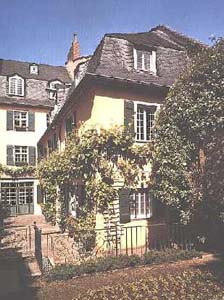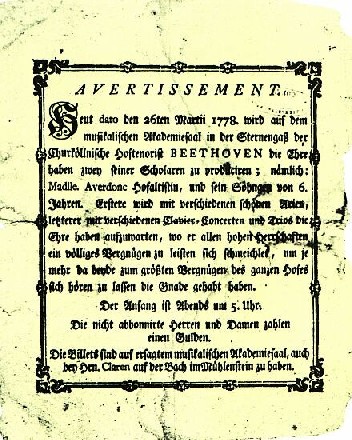 The Beethovenhaus in Bonn |
*On this point, we might wish to look at the contentions of two Beethoven biographers, Maynard Solomon and Barry Cooper. The Beethoven scholar Maynard Solomon contends that Beethoven's own uncertainty about his year of birth, his so-called birth year delusion, has at its roots the fact of his having been born after his first-born brother Ludwig Maria, whose loss might still have been felt strongly by his parents, and that their pain overshadowed his own early childhood. To this might have been added the fact that both infants had the same first name, Ludwig. (Solomon: 3-4, 21, 23, 155, 276-77). Barry Cooper, on the other hand, is stressing that the date of birth should in all likelihood have been December 16th, and the time of birth later in the day rather than earlier, taking into account the tradition of this age of baptizing children within 24 hours of their births (Cooper: 3).
**Today, the entire building in which Beethoven was born serves as Bonn's Beethovenhaus with a collection of memorabilia that is open for viewing to the public, and the Beethoven Archives which are engaged in serious research and which house an extensive collection of research material.
Beethoven would grow to have fond memories of his grandfather and would cherish them all his life. His mother built up in his mind an extremely positive image of the Kapellmeister, in contrast to the image of his less talented, strict father.
The boy's earliest music instructions were the piano lessons his father started to give him when he was four or five years old***.
***Beethoven's Bonn friend, Franz Gerhard Wegeler, recalled watching "the doings and sufferings of our Louis" from the window of a friend's house. The stout, stocky little boy with unruly black hair and expressive grayish eyes would stand on a stool so that his fingers could reach the piano and would thus go through the exercises his father had given him, sometimes crying in the process.
The goal Beethoven's father appeared to pursue in training his son was, at first, to turn him into a second Wunderkind like Mozart. From Johann van Beethoven's advertisement of March 26th, 1778, for a concert in Cologne in which one of his adult students, the singer Helene Averdonk performed as well as his son, we learn that he described Ludwig as his "little son of six years".
 Johann van Beethoven's Advertisement of the March 26, 1778 Concert in Cologne |
We also learn that, prior to this concert, he had his son play the piano before the Bonn court. From the fact that no further such concerts were held, we can deduct two things:
The novelty of piano Wunderkinder had worn off by that time;
Little Ludwig may have been a talented young pianist, but not a Wunderkind such as Mozart.
Before we discuss Beethoven's further musical training, we should look at his family life and at his schooling. Wegeler reports that he was attached to his gentle, yet serious mother, but that he had less of a bond with his strict father. He attended school for all of four years: the so-called Tirocinium, at which pupils were taught the basics of arithmetic, German language, and some Latin. Mr. Wurzer, the later President of the County Court of Koblenz, was Beethoven's classmate and recalled that the latter did not pay any attention to the instruction but was engrossed in his own daydreams and that he frequently appeared unkempt and dirty. Beethoven is also reported by the Fischer family, in whose house the family lived off and on, as not having spent much time in playing with other boys of his age, but as sticking to his musical studies, an activity he did not allow anyone to make fun of. Yet, Mrs. Fischer also found him involved in boyhood pranks with his brother Caspar Carl, stealing her rooster and laughing heartily when caught.
When Beethoven was eight years old, his father felt that he needed further musical training from other teachers. We soon find the lad Ludwig in a variety of different training scenarios:
At first, Johann had arranged for his tuition by the old Court organist, the Fleming van den Eeden. The latter was too old, however, to provide much training to Ludwig;
As far as organ practice was concerned, Ludwig soon made his own arrangements with various Bonn parishes and began, on a daily basis, to play the organ at the six o'clock mass in one or the other Bonn church*.
The tenor singer Tobias Friedrich Pfeiffer, who came to Bonn with the Grossmann and Hellmuth's theatrical company in 1779 and soon befriended Johann van Beethoven, was also a skilled pianist. It was decided that he should give Ludwig lessons. These took place mostly late at night, after Pfeiffer and Johann van Beethoven would return home from the tavern, drunk and boisterous, waking the boy up from his sleep and dragging him to the piano**.
A more suitable instructor, as far as ethics and morals was concerned, was Beethoven's maternal uncle, the young Court violinist Franz Rovantini. He taught Ludwig violin playing. This ended abruptly when the only 24-year-old died from an infection in September, 1781***.
*To this end, he had to be up and out of the house by not later than five-thirty. Could not his state of uncleanness in school at around seven-thirty have had its roots in his "slipping through his mother's fingers" at that early hour?
**At least by this time, if not earlier, Johann van Beethoven had started to drink excessively.
***On the occasion of his death, another cousin who worked as a domestic servant in Rotterdam, later came to visit the family. (In our next section, we will discuss new finding with respect to Beethoven's visit to Holland which, as has been found out after the publication of Thayer/Forbes in 1964, did not, as Thayer contends, take place in 1781 but later).
To sum up the course of Beethoven's musical training during his childhood, one can deduct that Johann van Beethoven, after he realized that he could not make money off his boy by passing him around as a child prodigy, he changed his focus to training his son to become a musical breadwinner to augment the family income, as soon as possible. Solomon contends that Beethoven not only resented his father for it, but at a deeper, hidden level, also his mother who passively suffered through her marriage and did not put up any active resistance against her husband. To her defense it must be mentioned that she was of weak health, possibly already suffering from consumption (tuberculosis), bore several children of whom, by this time, in addition to Ludwig, only his brothers Caspar Carl (born in 1774) and Nikolaus Johannes (born in 1776) had survived, and that she augmented the family income with some needlework.
What we can observe with respect to the length of Beethoven's childhood is that it practically ended when ye left the Tirocinium and became an apprentice musician at the Bonn court at age ten or eleven, at the latest.